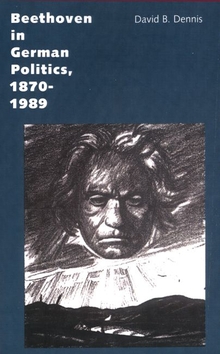Beethoven in German Politics, 1870-1989
WARNING
You are viewing an older version of the Yalebooks website. Please visit out new website with more updated information and a better user experience: https://www.yalebooks.com
David B. Dennis
Dennis shows for the first time that propagandists of every persuasion have equated Beethoven's works with dogma. In the late nineteenth century, supporters of Bismarck and the German emperors endorsed a militaristic interpretation forged during the Franco-Prussian War, while opponents promoted portraits of Beethoven as revolutionary. In the First World War, Beethoven was drawn into the trenches, where Germans countered enemy allegations that they had forfeited the right to enjoy his music. Beethoven interpretations fragmented the Weimar Republic, as every faction formulated its own variation. The Nazi view of the composer as Führer was enforced in the Third Reich. After 1945, German views of Beethoven corresponded to the division of the nation, but when the Iron Curtain collapsed in 1989 one sentiment rose to dominance: that all people could become brothers, just as the composer had wished in his Ninth Symphony. By establishing connections between Beethoven's art and public policy, Dennis has written a book of compelling interest to historians, musicologists, and Beethoven enthusiasts alike.
"In fascinating detail, Dennis introduces many 'Beethovens,' each fashioned as part of a process that transformed the composer into the most protean, and widely abused, cultural-political symbol in modern German history."—David Large, Montana State University
"Sophisticated in its conception, careful in its arguments, based on wide-ranging research, Beethoven in German Politics tells a fascinating story and places its young author in the select company of those cultural historians who are daring enough to take music and its interpretation as their subject. No one who reads this book, I suspect, will come away from it thinking the same way about the political meaning of music."—Robert Wohl, University of California at Los Angeles
"Dennis's book examines how Beethoven's image was appointed (or misappropriated) by a great range of German political movements from 1870. . . . Dennis traces with admirable thoroughness how Beethoven became the archetypal German cultural-political hero, so that, with the fall of the Berlin wall in 1989, his music was almost inevitably at the centre of celebrations."—Barry Cooper, BBC Music Magazine
"The book is from start to finish full of fascinating new material drawn from the ephemera of political campaigns and spectacles, middle-brow magazines, forgotten fan clubs, and the cultural pages of political-party weeklies. This is cultural history in a delightfully scavenging mode."—Celia Applegate, Central European History
"Apart from its splendid application of reception theory, Dennis's book also provides an informative mini cultural history of Germany from 1870 to 1989, as well as a devestating expose on the politicization of art and culture, already in full swing during the ninteenth century and perfected during the twentieth. It should be required reading for all graduate students about to embark on a career of interpretation, because it clearly demonstrates the tenuousness of the endeavour as well as the silliness, if not outright dishonesty, of so many of its practitioners."—Nicholas Vazsonyi, German Studies Review
"For among all of Germany's many cultural icons, as David Dennis shows in this thoroughly documented study, Beethoven offered the supreme example of a heroic artist who triumphed over adversity, both in his life and in his work."—Mark Evan Bonds, Journal of Modern History
"This is, to the best of my knowledge, the first comprehensive study, based on very extensive research and consultation of a wide range of sources. . . . There is much that is instructive and stimulating in this book."—Peter Pulzer, Music & Letters
"A book that should fascinate not only Beethoven devotees but also anyone interested in the elusiveness and malleability of historical evidence . . . through a molehill of established facts and a mountain of beloved legends. . . . A most impressive achievement . . . A partisan cannot help hoping that Mr. Dennis will continue to mine the musical vein of the historical range. In any case, he has opened interesting new terrain for musicologists."—James R. Oestreich, New York Times
"[This book] should fascinate not only Beethoven devotees but also anyone interested in the elusiveness and malleability of historical evidence."—James R. Oestreich, New York Times
"David B. Dennis has written a work that adds an important dimension to the study of how Ludwig van Beethoven's music was received over a long period of time."—William Weber, Notes
"The author is to be congratulated for his in-depth research, his ability to synthesize much refractory material and his unfailing skill in translating even knotty, arcane German texts into accessible English. Anchoring scholarly footnotes and telling illustrations abound."—Steven R. Cerf, Opera News
"Dennis's persuasive and appetizing account should be read for both profit and pleasure by students of Germany, of politics, and, not least, of music."—The Key Reporter
Publication Date: March 11, 1996
21 b/w illus.







